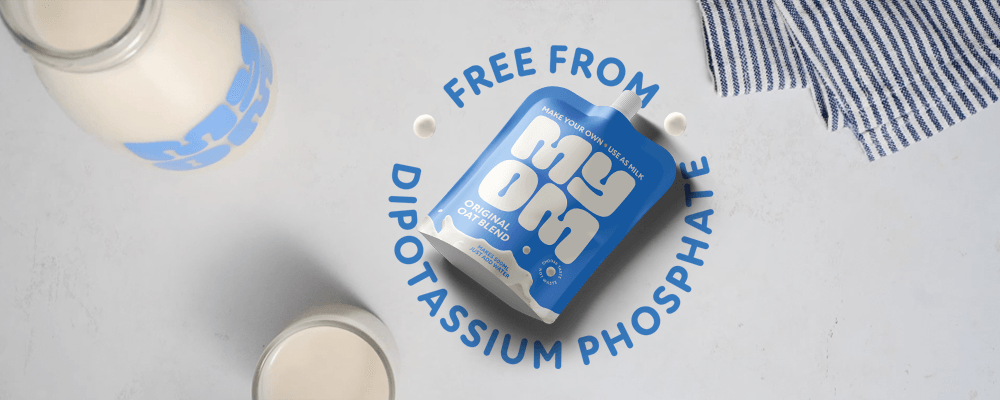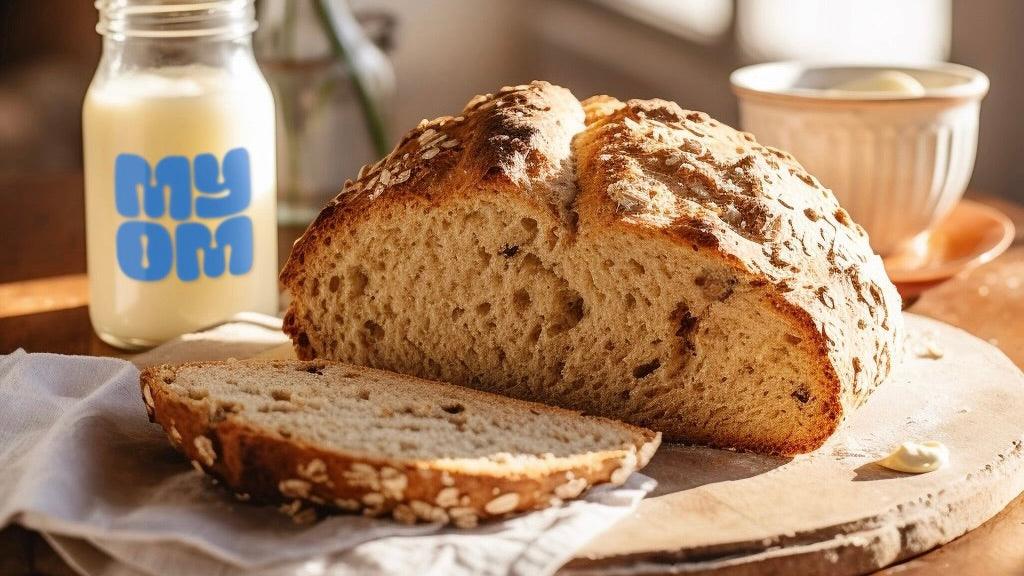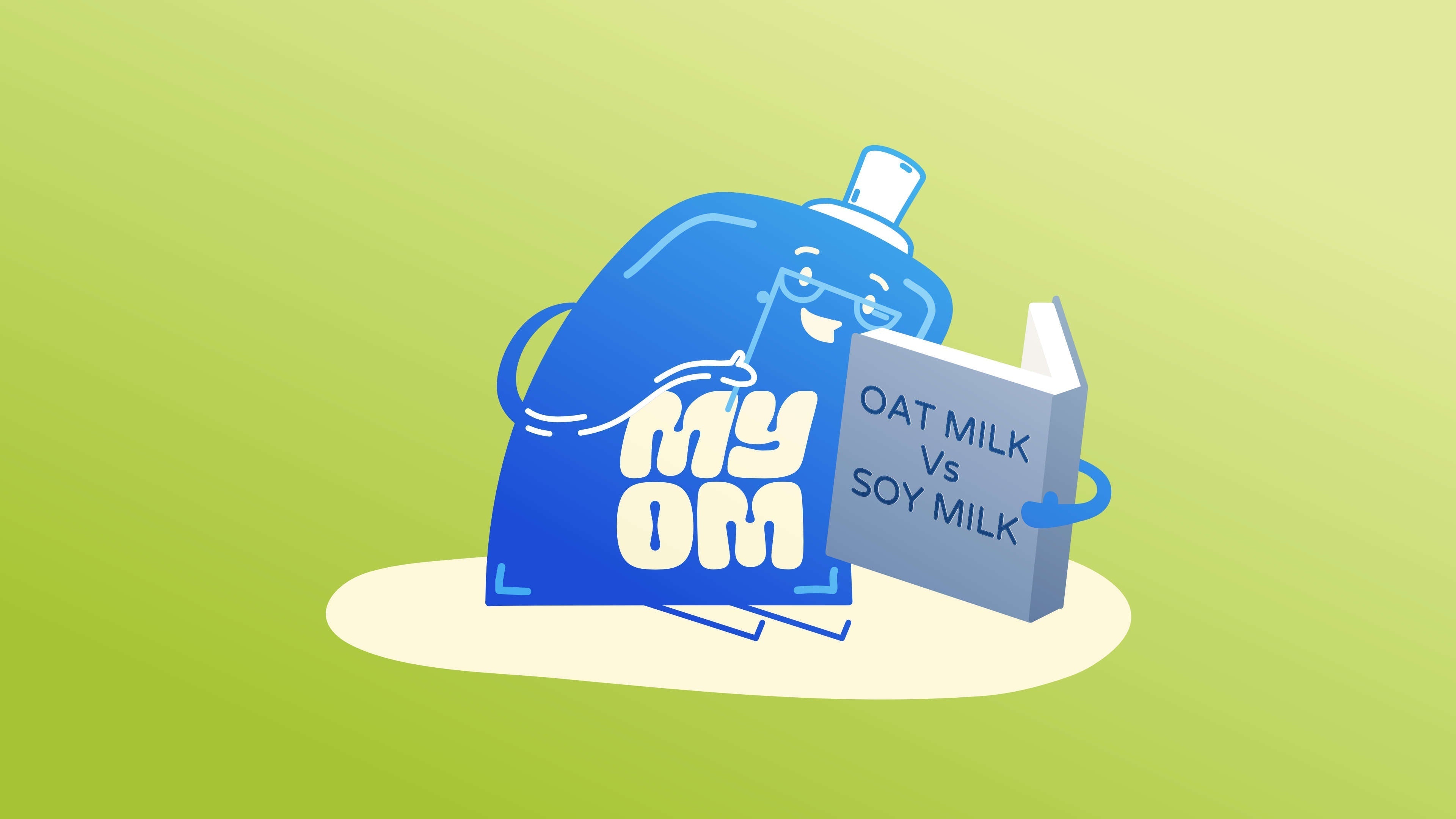We are always striving to bring you the best possible product. This is reflected in taste, with 83% of oat milk drinkers recommended MYOM after trying it.
Not only that, but we work on bringing you the cleanest ingredient label we can, which is why we never add Dipotassium Phosphate. We feel this is particularly important with the research showing the increasing use and therefore intakes of phosphate from food additives.
Vitamin and minerals on MYOM’s ingredient list.
You will notice that MYOM does include calcium carbonate, and potassium iodide. These are minerals that we add to ensure MYOM contains calcium, iodine, and vitamin B12 in similar (or better) levels than found in semi-skimmed cow’s milk. We even make sure it includes a source of vegan-friendly vitamin D, given many of the population are thought to be deficient.
Why do most Oat Milk brands add Dipotassium Phosphate?
In oat milk, it is often used as an acidity-regulator, said to help the oat milk interact with more acidic coffee, preventing splitting and allowing it to steam better. We feel ours steams particularly well without the need for this chemical, read more about why we chose not to use it below.

How can I avoid Dipotassium Phosphate in Oat Milk?
If you want to reduce intakes, the best way is to look out for the ingredient, Dipotassium Phosphate, by carefully checking food labels. Especially in oat milks where it can frequently appear, in fact it is in most major oat milk brands – but not MYOM. It also has the European food additive number E340(ii).
Although other brands say they add Dipotassium phosphate to help prevent curdling in coffee, you can rely on MYOM to be the perfect partner for your coffee and tea without the addition of this additive.
MYOM has a rich and creamy taste that perfectly pairs with coffee and tea. For all the flat white, latte lovers, and baristas, we know it’s important for your milk to froth too. MYOM performs beautifully, smooth and creamy when steamed, with a perfect froth.
If tea is your thing, MYOM’s mild taste, and subtle sweetness complements the earthy notes of tea without overpowering it.
Let’s not forget that this is all achieved without the addition of Dipotassium phosphate – setting us apart from other brands.
What is Dipotassium Phosphate?
You may have noticed Dipotassium Phosphate on the labels of other plant milks. Perhaps it’s an ingredient you don’t recognise given it’s not something we’d have in the store cupboard. So, what is it?
Dipotassium Phosphate is a food additive, commonly found in oat milk products but sometimes also used in cheeses or coffee creamers. It is also used outside of the food industry in anti-freeze, fertilisers, and paper-processing (1).
How is Dipotassium Phosphate made?
Dipotassium Phosphate is an inorganic compound, which can be made commercially from naturally occurring Phosphate rock that is combined with sulfuric acid and other substances, to produce a white, grainy powder.
Why is Dipotassium Phosphate used in food and drinks?
Dipotassium Phosphate is often used to enhance texture, shelf-life, and stability. It functions as an emulsifier, stabiliser, preservative, texturiser and buffering agent.
Is Dipotassium Phosphate bad for you?
Although FDA class Dipotassium Phosphate as “generally recognised as safe”, and it is a permitted additive within the EU, there are upper acceptance levels of dietary phosphorus set.
This is because research has found elevated Phosphate levels in the blood are associated with negative health implications, including advanced kidney disease mortality, and cardiovascular events and mortality in the general population. This is partly due to excess phosphorus consumption leading to disruption in the calcium/phosphorus balance.
Because of the increased use of food additives, the estimated daily intakes of Phosphate-containing additives such as Dipotassium Phosphate is said to have more than doubled since the 1990s (2). The European Food Safety Authority (EFSA) issued new advice on Phosphates in 2019, after finding total intake of Phosphates from food may exceed the safe level set by EFSA, with food additives thought to contribute 6-30% of total average intakes of phosphorous. They estimated that dietary exposure to Phosphates may exceed the new acceptable daily intake (ADI) for infants, toddlers and children with average consumption of Phosphates in their diet, and teenagers whose diet is high in Phosphates (3).
There are still some unknowns and controversy in the research about the impact of natural Phosphates vs inorganic Phosphate (e.g. Dipotassium Phosphate) on serum (blood) Phosphate levels. A literature review published in 2012 found that unlike naturally occurring Phosphate in food, Phosphate in food additives is almost completely reabsorbed in the gastrointestinal tract – meaning it can impact serum blood levels. The authors concluded that inorganic Phosphate in food additives are effectively absorbed and can measurably elevate the serum Phosphate concentrations in patients with advanced chronic kidney disease (CKD). The authors of the paper therefore concluded that, “in view of the high prevalence of and the potential harm caused by Phosphate additives in food, the public should be informed that added Phosphate is damaging to health” (2).
References
- PubChem. Dipotassium phosphate [Internet]. [cited 2024 Jan 26]. Available from: https://pubchem.ncbi.nlm.nih.gov/compound/24450
- Ritz E, Hahn K, Ketteler M, Kuhlmann MK, Mann J. Phosphate Additives in Food—a Health Risk. Dtsch Ärztebl Int. 2012 Jan;109(4):49–55.
- EFSA issues new advice on phosphates | EFSA [Internet]. 2019 [cited 2024 Jan 26]. Available from: https://www.efsa.europa.eu/en/press/news/190612




